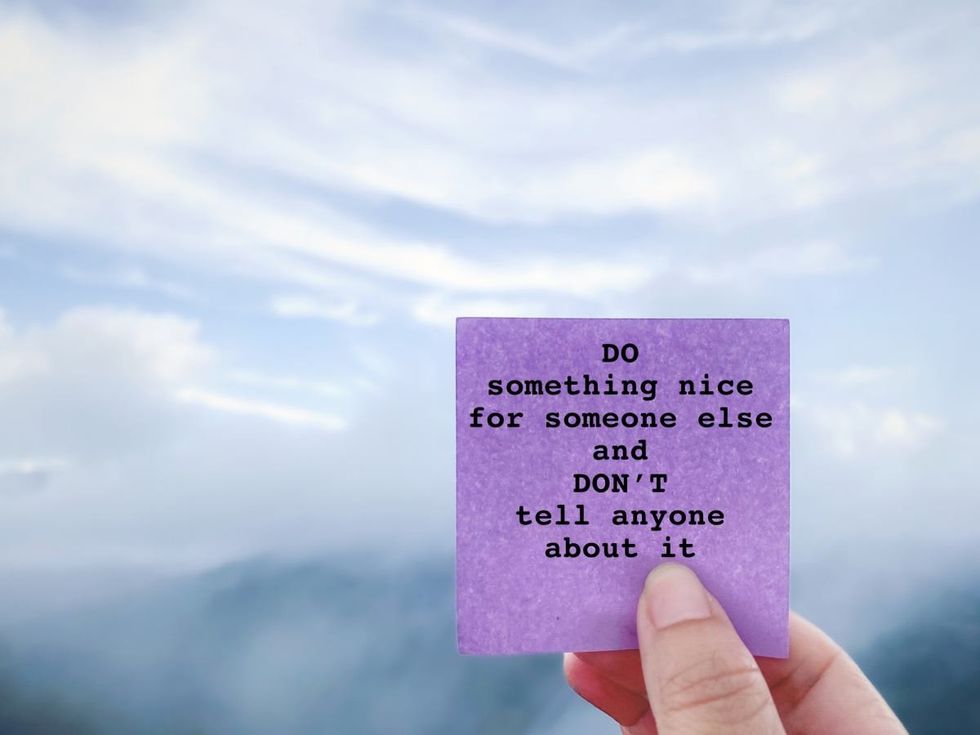Random acts of kindness go beyond feeding people or making donations to charities. Even the smallest gestures can make a big difference in someone's life. A woman from North Carolina experienced such kindness in the least expected place—on the floor of a Walmart store. On November 13, 2017, which happened to be "World Kindness Day," a stranger left behind a heartwarming surprise for Julia Stultz, her family, and the store’s workers by leaving an envelope of cash to spark a chain of goodwill.

“It’s uncommon nowadays,” some customers said in disbelief, according to Fox News affiliate WJZY. It happened when Julia and her family were sauntering through the shelves stocked with groceries at the big-box retail center in Charlotte. When they made their way into the clothing section, Julia’s son pointed out something. He had spotted an envelope lying on the floor. They picked up the envelope to see if they might find its owner.

Both sides of the envelope had handwritten messages scrawled into it. One flap read "With Love, Amen," and the message on the other said, “If this card has found you, open it. It's yours.” Julia slipped her hand inside the envelope and from it, she pulled out a crisp $100 note along with a card that had an important instruction written on it. According to this instruction, the finder of the card was supposed to “pay it forward.”
Signing their name as “a friend,” the stranger had written, “May this gift bring you a little peace today. One day, please pay it forward. May the blessings of God be on you always!" Julia regretted not being able to thank the generous human in person. Meanwhile, the news outlet reached out to her fellow customers who were as surprised by this unusual act of kindness, as she was.

"I’ve always wondered if there was stuff like that in the world and I’ve always said if I have the chance to pay it forward, I would absolutely do it," said Akilli Omari, another Walmart customer, before adding, “It’s uplifting and inspiring.” This random event energized Omari’s spirits so much that he said he would start his own “pay it forward” chain of kindness. "Maybe we should all consider doing one ourselves. I think I will." One more fellow customer, Lamar McLaughlin, said, "I think people should be more kind to each other. It's just, I will say it's not hard to do, but it's uncommon nowadays."
On social media, people are singing praises for the anonymous person who stepped forward to initiate this whole kindness chain. “Restored my faith in humanity,” said Rose Schreyer. Roxy Price said, "Good to hear nice things in this sad & crazy world. God bless the person who did that. Praying the lady who got it was able to pay it forward. You never know when someone needs it." Gerry Johnson commented, “There are still amazing and thoughtful people left in this screwed-up world!”


















 Revenge can feel easier than forgiveness, which often brings sadness or anxiety.
Revenge can feel easier than forgiveness, which often brings sadness or anxiety. 
 In the past two years, two malaria vaccines have become available for babies starting at 5 months of age.
In the past two years, two malaria vaccines have become available for babies starting at 5 months of age. By exploiting vulnerabilities in the malaria parasite’s defense system, researchers hope to develop a treatment that blocks the parasite from entering cells.
By exploiting vulnerabilities in the malaria parasite’s defense system, researchers hope to develop a treatment that blocks the parasite from entering cells. Created with
Created with 

 Volunteers who drive homeless people to shelters talk with a person from Ukraine in Berlin on Jan. 7, 2026.
Volunteers who drive homeless people to shelters talk with a person from Ukraine in Berlin on Jan. 7, 2026.
 Tasks that stretch your brain just beyond its comfort zone, such as knitting and crocheting, can improve cognitive abilities over your lifespan – and doing them in a group setting brings an additional bonus for overall health.
Tasks that stretch your brain just beyond its comfort zone, such as knitting and crocheting, can improve cognitive abilities over your lifespan – and doing them in a group setting brings an additional bonus for overall health. Overdoing any task, whether it be weight training or sitting at the computer for too long, can overtax the muscles as well as the brain.
Overdoing any task, whether it be weight training or sitting at the computer for too long, can overtax the muscles as well as the brain.

 Amoxicillin is a commonly prescribed broad-spectrum antibiotic.
Amoxicillin is a commonly prescribed broad-spectrum antibiotic.  Chart: The Conversation, CC-BY-ND
Chart: The Conversation, CC-BY-ND
 Counterintuitively, social media can make you feel more bored and lonely.
Counterintuitively, social media can make you feel more bored and lonely. Talking about what you’ve read can add a social dimension to what can be a solitary activity.
Talking about what you’ve read can add a social dimension to what can be a solitary activity.